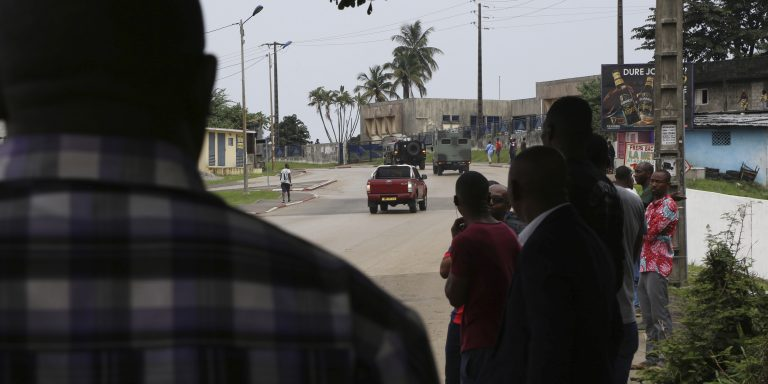- Just weeks after a coup in Niger saw a military junta oust the democratically elected government, members of the elite Republican Guard in Gabon launched a coup in the oil-rich Central African nation.
- Anti-French sentiment throughout Africa is on the rise, signaling the decline of Françafrique, or French influence throughout parts of sub-Saharan Africa.
- While Gabon has not been plagued by jihadist violence as some countries in the Sahel have experienced—including Mali, Burkina Faso, and Niger—there has been increasing pressure in recent years directed at the ruling regime, which has grown rich while over a third of the country’s 2.4 million people live in poverty.
- Large swaths of sub-Saharan Africa are now dominated by military juntas, which have usurped ruling governments while Western countries are drastically reducing their footprint on the continent.
Just weeks after a coup in Niger saw a military junta oust the democratically elected government, members of the elite Republican Guard in Gabon launched a coup. The oil-rich Central African nation and OPEC member is a longstanding ally of France and is considered a bulwark of relative stability in the region, even though its leader Ali Bongo Odimba, survived a coup attempt as recently as 2019, which occurred after he suffered a stroke that left him debilitated for months. The coup against Bongo, who had just announced victory in an election granting him a third consecutive term, was reportedly engineered by Gen. Brice Oligui Nguema, whose unit was tasked with protecting Gabon’s aging and sick president. The political opposition in Gabon accused Bongo of rigging the election, while there were widespread concerns over the potential for political violence. Bongo had received 64 percent of the vote in recent elections, which EU foreign policy chief Josep Borrell claimed “were stolen,” going on to add that “this is an African problem that has to be solved by the Africans. We will support…the efforts of ECOWAS.” Bongo is part of a political dynasty in the country that has kept him in power since 2009. Omar Bongo Odimba, ruled the country from 1967 until he handed over power to his son, the current president. “We have decided to defend peace by putting an end to the current regime,” said a spokesman for the group responsible for the coup, which calls itself the Committee for the Transition and Restoration of Institutions.
Military officers seized power, annulled the election results, suspended the government and closed the country’s borders, dissolving state institutions and moving quickly to gain a stranglehold on power. Curfews were enforced and the internet was temporarily blocked in anticipation of demonstrations and protests. Bongo released a video in which he can be seen desperately requesting assistance, saying, “I’m calling you to make noise,” in a plea to Gabonese citizens. But hundreds of Gabonese took to the streets of the capital Libreville to celebrate Bongo’s ouster. France, unsurprisingly, has fully condemned the coup. Olivier Véran, a French government spokesperson, said that “France is closely monitoring the development of the situation on the ground and reaffirms its wish for the election results, once known, to be respected.” France maintains several hundred troops in Gabon and has longstanding economic interests in the country (especially in the energy sector), both of which are now at risk. There are growing fears over instability that could spread and spillover Gabon’s borders, negatively impacting Cameroon, Guinea, or the Republic of Congo (Brazzaville).
The coup in Gabon marks the ninth coup in Africa over the past three years, a situation that has been accompanied by a rise in jihadist violence perpetrated by groups linked to al-Qaeda and Islamic State, as well as the more robust presence of Russian mercenaries from the Wagner Group. The private military company has forces in Cameroon, which borders Gabon to the north. And while Gabon has not been plagued by jihadist violence as some countries in the Sahel have experienced—including Mali, Burkina Faso, and Niger—there has been increasing pressure in recent years directed at the ruling regime, which has grown rich while over a third of the country’s 2.4 million people live in poverty, with large segments of young people unemployed. Still, many Western countries have overlooked these shortcomings and see Gabon playing an important role in other areas. Gabon has been feted by some climate activists who laud the country for its commitment to maintaining carbon sinks throughout the Congo Basin. Gabon has also hosted U.S. troops deployed to assist with worsening conditions in the Democratic Republic of Congo (DRC), where they could help U.S. citizens, personnel, and diplomatic facilities in the event of an emergency.
Large swaths of sub-Saharan Africa are now dominated by military juntas, which have usurped ruling governments while Western countries are drastically reducing their footprint on the continent. Anti-French sentiment throughout Africa is on the rise, signaling the decline of Françafrique, or French influence throughout parts of sub-Saharan Africa. While French President Emmanuel Macron has struggled with domestic issues, including the French economy and protests over raising the age of retirement, France’s overseas influence, especially in Africa, has taken a major hit. Some analysts suggest that France’s withdrawal from Mali and the Sahel more broadly are emblematic of failed French policies in the region, which have emboldened military juntas to flex their muscles. Weak governance, porous borders, and high levels of corruption have made some African governments vulnerable to coups. Where Western troops are deployed but remain divorced from a broader strategy in the region, their presence alone can become counterproductive and contribute to animosity among populations that see no alternative except to back coup leaders. Still, as France’s role in Africa continues to diminish, so too will its global stature.

